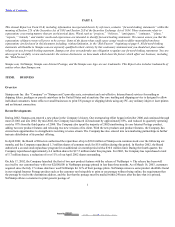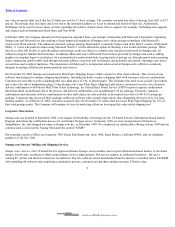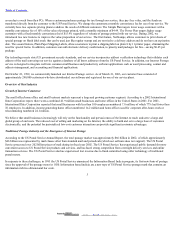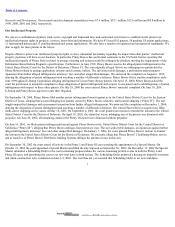Stamps.com 2002 Annual Report Download - page 15
Download and view the complete annual report
Please find page 15 of the 2002 Stamps.com annual report below. You can navigate through the pages in the report by either clicking on the pages listed below, or by using the keyword search tool below to find specific information within the annual report.
Table of Contents
generate significant interest in any of our services. Furthermore, we may be unable to generate significant interest in our services in a
cost-effective manner. If we fail to generate interest in our services or to acquire customers in a cost-effective manner, our results of operations
will be adversely affected.
If we fail to meet the demands of our customers, our business will be substantially harmed and could fail.
Our Internet Postage services must meet the commercial demands of our customers, which range from individuals to small businesses. We
cannot be sure that our services will appeal to or be adopted by a wide range of customers. Moreover, our ability to obtain and retain customers
depends, in part, on our customer service capabilities. If we are unable at any time to address customer service issues adequately or to provide a
satisfactory customer experience for current or potential customers, our business and reputation may be harmed. If we fail to meet the demands
of our customers our results of operations will be adversely affected.
Success by Pitney Bowes in its suits against us alleging patent infringement could prevent us from offering our Internet Postage
services and severely harm our business or cause it to fail.
On June 16, 1999, Pitney Bowes sued us for alleged patent infringement in the United States District Court for the District of Delaware (“Pitney
I”). The suit originally alleged that we are infringing two patents held by Pitney Bowes related to postage application systems and electronic
indicia. The suit seeks treble damages, a preliminary and permanent injunction from further alleged infringement, attorneys’ fees and other
unspecified damages. We answered the complaint on August 6, 1999, denying the allegations of patent infringement and asserting a number of
affirmative defenses. Pitney Bowes filed a similar complaint in early June 1999 against E-Stamp Corporation, alleging infringement of seven
Pitney Bowes patents. On April 13, 2000, Pitney Bowes asked the court for permission to amend its complaint to drop allegations of patent
infringement with respect to one patent and to add allegations of patent infringement with respect to three other patents. On July 28, 2000 the
court entered Pitney Bowes’ amended complaint. On June 18, 2001, E-Stamp and Pitney Bowes agreed to settle their litigation.
On September 18, 2000, Pitney Bowes filed another patent infringement lawsuit against us in the United States District Court for the Eastern
District of Texas, alleging that we are infringing four patents owned by Pitney Bowes related to multi-carrier shipping (“Pitney II”). The suit
sought unspecified damages and a permanent injunction from further alleged infringement. We answered the complaint on December 1, 2000,
denying the allegations of patent infringement and asserting a number of affirmative defenses. The United Parcel Service acquired our iShip
multi-carrier shipping service assets on May 18, 2001. On September 4, 2001, the court granted our motion to transfer the lawsuit to the United
States District Court for the District of Delaware. On April 18, 2002, the claim that we are infringing one of the patents was dismissed with
prejudice. On June 20, 2002, all remaining claims in the Pitney II lawsuit were dismissed without prejudice.
On June 14, 2001, we filed a patent infringement lawsuit against Pitney Bowes in the United States District Court for the Central District of
California (“Pitney III”), alleging that Pitney Bowes infringes four patents we own. The suit seeks treble damages, an injunction against further
alleged infringement, attorneys’ fees and other unspecified damages. On January 7, 2002, the court granted Pitney Bowes’ motion to transfer
the lawsuit to the United States District Court for the District of Delaware. We presently allege that Pitney Bowes’ ClickStamp Online service
and at least five of Pitney Bowes’ DM Series Mailing Systems infringe the patents at issue in this suit.
On September 30, 2002 the court stayed all activity in the Pitney I and Pitney III cases pending the appointment of a Special Master. On
October 15, 2002 the court appointed a Special Master and lifted the stay imposed on September 30, 2002. On December 13, 2002 the Special
Master submitted a Scheduling Order to the court containing proposed dates for various remaining pretrial events in both the Pitney I and
Pitney III cases, and permitting the court to set new trial dates in both actions. The Scheduling Order proposed a hearing on dispositive motions
and claim construction to be conducted on June 3-5, 2003. The court has not yet executed that Scheduling Order or set new trial dates.
11
2003. EDGAR Online, Inc.
























